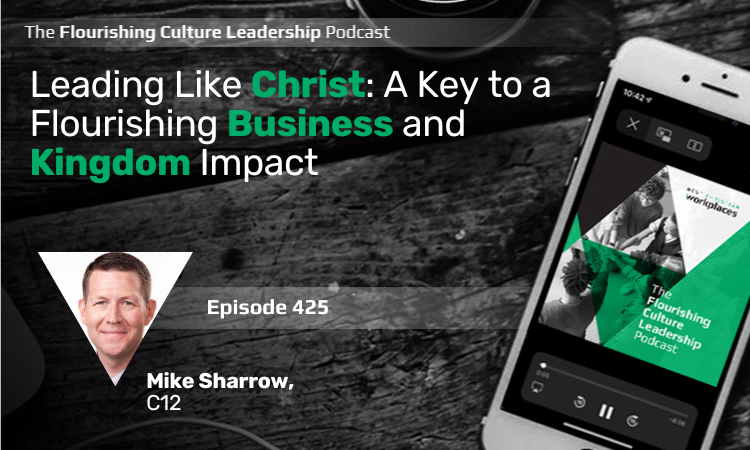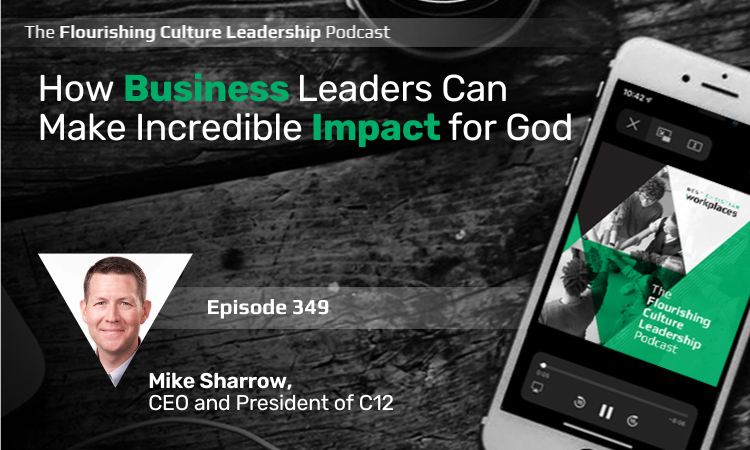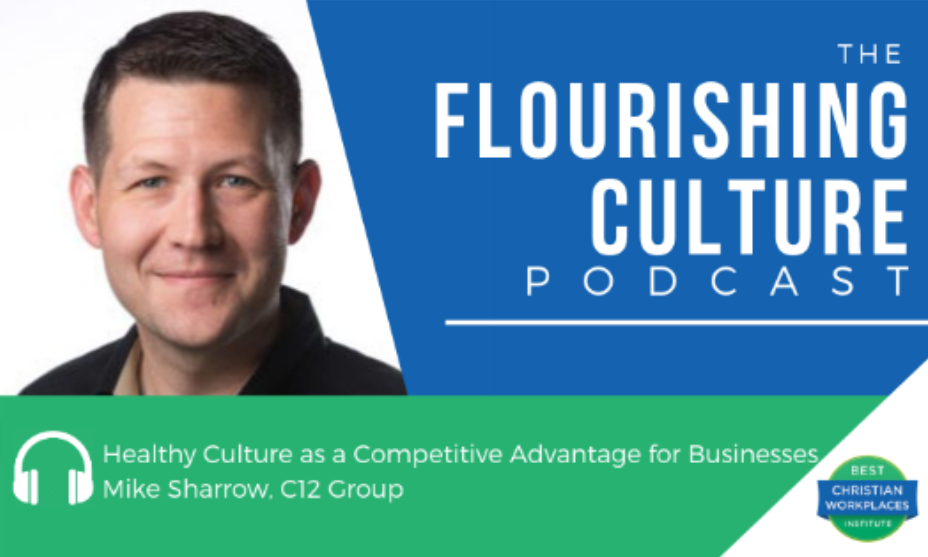How can embodying the fruit of the Spirit transform your leadership and workplace culture? In this episode, Mike Sharrow, CEO of C12, shares powerful insights on leading with character, building trust, and modeling Christ in daily decisions to inspire Kingdom impact.
Listen to the Audio
Listen in Apple Podcasts | Listen in Spotify | Listen in YouTube Music
In this episode:
- Christian Leadership and Character:
- The distinction between "Christian doing" versus "Christian being" in leadership. (04:13)
- The fruit of the Spirit as the ultimate standard for Christian character in leadership. (04:48)
- Strong Christian character is reflected in:
- Consistency across environments. (04:53)
- Attributes such as courage under fire, compassion, responsibility, and truthfulness. (05:14)
- Alignment with biblical teachings on leadership (e.g., character, temper, and heart). (05:43)
- Example of a Leader with Christian Character:
- Mark McClain:
- CEO who exemplifies high integrity and care for employees, even those who do not share his faith. (07:51)
- Leadership marked by dignity, trust, and non-greed-driven motives. (08:21)
- Results include:
-
-
-
- Exceptional employee retention and loyalty. (08:46)
- Absence of lawsuits despite thousands of employees over 18 years. (08:51)
- A workplace culture driven by virtue and goodness. (09:01)
-
-
- Publicly promotes the fruit of the Spirit on platforms like LinkedIn, resonating even with non-believers. (09:33)
- Impact of a Flourishing Workplace Culture:
- Benefits of fostering a flourishing culture:
- Higher employee retention and engagement. (11:09)
- Improved productivity, customer service, and financial performance (e.g., reduced hiring and training costs). (11:25)
- Greater resiliency during crises (e.g., COVID-19 pandemic). (11:42)
- Specific example:
- A commercial cleaning business in Boston reduced turnover by 65%, eliminated marketing costs, and grew through customer referrals due to a culture of love and employee care. (12:01)
- Long-term ROI:
- While cultural changes may not yield immediate financial results, businesses often see significant profitability within 2-3 years. (12:39)
- Challenges of Living Out Faith in the Workplace:
- Surprising Reactions to Faith: Al shares disappointment when a colleague of 15 years was surprised to learn he was a Christian, highlighting the challenge of making faith visible in professional environments. (16:37)
- Unspoken Faith Perceptions: Mike reflects on an experience where colleagues doubted the authenticity of his faith because he avoided discussing it, despite his intention to love them through actions. (16:55)
- The Role and Value of Peer Groups for Christian Leaders:
- Peer Accountability and Growth: Mike emphasizes the unique support peer groups like C12 provide, including:
- Honest feedback on personal blind spots and recurring issues. (18:53)
- Confidentiality that allows leaders to be vulnerable without consequences. (19:43)
- Accountability for personal character, such as addressing issues like anger, anxiety, or marriage concerns. (20:08)
- Comparison with Other Leadership Support: A CEO visiting C12 expressed envy for the honest and trusted feedback within the group, contrasting it with the impersonal advice of consultants or boards. (20:52)
- Biblical Parallel: The example of Nathan confronting David is used to underline the importance of having truth-speakers in a leader's life. (21:50)
- Practices to Cultivate Christian Character and Faith:
- Daily Time with God: Vibrant morning time with God is essential, framed as a "can't-miss meeting" to align leadership with faith. (24:01)
- Retreat Rhythms: Personal retreats, including fasting, silence, solitude, and practicing Sabbath, help leaders reset and refocus spiritually. (24:54)
- Accountability with Reflection: Regular mechanisms for accountability—through peer groups or small groups—encourage leaders to take inventory of their character and actions, ensuring alignment with their faith. (25:36)
- Challenges and Opportunities for the Next 5-10 Years
- Cultural and Societal Challenges:
- Increasingly post-Christian, post-truth, and politically polarized society. (30:16)
- Lack of wisdom and understanding despite the rapid growth of data and information (DIKW principle: Data, Information, Knowledge, Wisdom). (30:36)
- Generational gaps, particularly with Gen Z and millennials being spiritual but not Christian, and lacking mentors, elders, and wisdom. (31:51)
- Opportunities for Christian Leaders:
- Embracing challenges as validation of their calling.
- Practicing incarnational leadership to meet people where they are, delivering love, truth, and dignity. (31:24)
- Addressing the next generation’s desire for purpose, authenticity, and meaning. (31:56)
- Serving as bridges in a chaotic, wisdom-deprived environment. (32:05)
- Key Reflections
- Leadership as an opportunity to reflect Christ’s character in every area of life through integrity, consistency, and love. (33:39)
- Peer groups and mentorship as essential tools for leaders to overcome loneliness and grow spiritually and professionally. (34:07)
- The importance of spiritual disciplines and starting the day with a vital experience with Christ to serve effectively with a “full cup.” (34:19)
- Integration and Wholeness Over Balance
- Moving beyond compartmentalized thinking (e.g., work-life balance) to pursue integration and wholeness. (35:14)
- Emphasizing that dysfunction or fruit in one area of life affects the whole, much like how actions in one part of a swimming pool diffuse throughout. (35:34)
- Encouraging leaders to pursue whole-life character to bring compounded benefits across work, home, and relationships. (36:02)
Read the Transcript
Read a complete, word-for-word transcript of the episode
FOLLOW OUR HOST
Follow our Host, Al Lopus, on LinkedIn & Twitter.
Email our host at al@workplaces.org
 Best Christian Workplaces
:
January, 13 2025
Best Christian Workplaces
:
January, 13 2025


